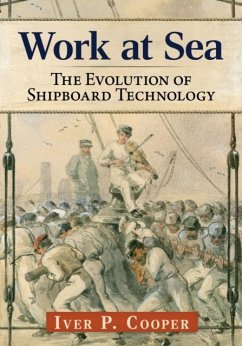For millennia, ships have been used to fish; transport passengers and cargo; and bring divers to particular locations to harvest sea life, salvage wrecks, or conduct studies. Anchors must be raised or lowered; rigging adjusted; and cargo loaded, stowed, and ultimately delivered. Employing navigation, equipment, and methods, ships must be steered to their destination despite the vagaries of wind and wave, communicate with other ships or those onshore, and operate within parameters that may encompass issues such as efficiency and safety. This book examines innovations in hardware and methodology related to work on (and under) the sea from scientific and historical perspectives. Focusing on how things work, this dynamic and well-illustrated history traces the technology and techniques that evolved over centuries of seafaring.
Bitte wählen Sie Ihr Anliegen aus.
Rechnungen
Retourenschein anfordern
Bestellstatus
Storno








